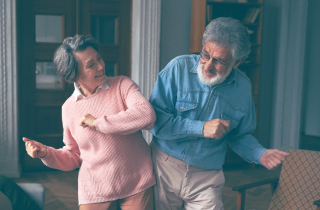The Timeless Tapestry: Memory and Cognitive Functions in Old Age
Memory in old age is a curious thing, like a grand library where the tomes of life’s moments sit on dust-free shelves, each one waiting to be opened, each one telling its tale. But as the years unfurl, some pages become harder to read, some chapters dim. It’s not that the library grows smaller; rather, it’s as if a gentle fog has settled. For seniors, preserving the vividness of this inner tapestry – the agility of thought, the clarity of memory – is both an art and a science. Here, our caregivers explore ways to brighten these cherished memories and keep the mind nimble and curious, a vibrant garden that blossoms across time.
1. The Dance of Daily Rituals for save improving memory for the elderly
In the golden years, routine can be a trusted friend, a soft anchor that brings stability. Seniors benefit from maintaining daily rituals that reinforce memory. Small habits – setting keys in the same spot, keeping a daily journal, or creating a consistent morning routine – cue the mind to recall, sharpening the patterns that protect against forgetfulness. These rituals become gentle reminders, woven seamlessly into each day.
Tip: Encourage seniors to create visual cues, like labels on drawers or checklists, which support routine and give memory a steady rhythm.
2. Memory maintenance tips for the elderly: Exercising Language and Vocabulary
Language is a tapestry of sounds and meanings, and in the senior mind, it is a treasure trove of wisdom. Reading, storytelling, and word games like crosswords or Scrabble stimulate memory and improve cognitive functions. These exercises keep the language centers of the brain active, fostering mental agility and lending seniors the joy of rediscovering the richness of language.
Tip: Seniors can keep a “word garden” journal, adding a new word each day, writing its meaning, and using it in sentences to plant it firmly in memory.

3. The Symphony of Movement: Physical Exercise for the Mind
Movement has a marvelous way of supporting the mind. Gentle exercises like walking, stretching, and even dance enhance circulation and release endorphins, creating a harmonious flow that refreshes the brain. Physical activity has been shown to improve memory and reduce the risk of cognitive decline, with the added benefit of reducing stress and promoting better sleep.
Tip: Seniors can explore activities like Tai Chi or simple stretching routines, which combine physical motion with mental calm, creating a symphony that benefits the whole being.
4. Nourishing the Mind’s Garden: Diet and Brain Health
Food can be medicine, especially when it comes to supporting memory and cognitive function. Antioxidant-rich fruits, omega-3-rich fish, leafy greens, and nuts like walnuts serve as nutrients for the brain, protecting against age-related cognitive decline. For seniors, enjoying these foods becomes a small ritual of self-care, each bite nurturing the memory centers and enhancing mental clarity.
Tip: A “memory diet” – rich in blueberries, salmon, leafy greens, and a splash of olive oil – creates a daily dose of brain-boosting power, keeping the mind well-nourished.
5. The Theater of the Mind: Brain Games and Cognitive Exercises for Elderly
Mental agility is like a stage where memory, creativity, and logic perform in harmony. Cognitive exercises, including puzzles, memory games, and logic problems, keep the brain engaged and resilient. Websites and apps offer an array of brain games tailored for seniors, each one a playful exercise in focus, recall, and critical thinking.
Tip: Encourage seniors to set aside 15 minutes daily for brain games. Sudoku, online puzzles, and memory-matching games offer a stimulating way to enhance cognitive functions while having fun.
6. Brain health for seniors: Meditation and Cognitive Clarity
Meditation offers the brain a quiet moment to breathe, a space for memory to settle and for thoughts to align. Mindfulness meditation practices – focusing on the breath, observing thoughts without judgment – have been shown to reduce stress, improve focus, and even increase gray matter in the brain. For seniors, it becomes a soothing ritual, like clearing the fog from a morning window to reveal clarity and calm.
Tip: Seniors can begin with five-minute guided meditations, focusing on simple breathing exercises that create a calm foundation for mental agility.
7. Social Storytelling and Conversations preventing cognitive decline in elderly
Social interaction is a nourishing fountain for cognitive function. Whether over a cup of tea with a friend or a weekly call with a family member, conversations ignite memories and encourage mental engagement. Seniors can swap stories, recall past adventures, or even share favorite recipes, each conversation strengthening recall and enriching the mind’s tapestry.
Tip: Encourage seniors to participate in community groups or book clubs, where discussions not only exercise memory but also offer a sense of connection and belonging.
8. Engaging in Meaningful Activities for mental agility in old age
Purpose is like sunlight for the soul, and seniors who find meaningful activities experience a boost in cognitive health. Whether through volunteer work, gardening, or painting, having a purposeful pursuit enriches memory and nurtures mental agility. This purpose doesn’t have to be grand; it can be as simple as tending a small garden or knitting blankets for loved ones. Each act is a reminder that one’s contributions remain valuable.
Tip: Seniors can explore hobbies that blend creativity and purpose, such as joining a community art class, volunteering locally, or starting a family history project.
9. Lifelong Learning: Keeping Curiosity Alive
Learning something new brings the thrill of discovery, keeping memory sharp and the mind receptive. Seniors can embark on virtual tours of museums, take online classes, or join a language group. The act of learning revitalizes neural connections, enhancing memory and encouraging mental resilience. New experiences, even in small doses, prevent cognitive decline, keeping the mind bright and open.
Tip: Encourage seniors to try online platforms like Coursera or MasterClass, where they can learn from experts and engage in topics that spark their interest.
In Closing: The Ever-Flowing Fountain of Memory
Memory in the golden years is a gift that unfolds softly, a treasure to be cherished and tended. Each tip, each gentle exercise, is a drop in the fountain of mental agility, a ritual that preserves the vividness of life’s moments. For the elderly, cognitive health is more than preserving memory; it’s about keeping the mind curious, open, and engaged, like a well-tended garden that continues to bloom.
With these practices, the tapestry of memory is not merely preserved – it flourishes, inviting seniors to enjoy the richness of each thought, each moment, each cherished recollection. And in this garden of the mind, age is not a barrier but a testament to the power and beauty of a life deeply lived, woven in memories that shine as brightly as the morning sun.
At Angel Care Inc., we believe care is more than assistance; it is a nurturing touch that honors each memory, every laugh, and all the tender moments that make a life whole. In New York, our mission is to help your loved one live with dignity and joy, filling each day with the comfort of familiar faces and the warmth of attentive hands. Our caregivers are not just helpers—they are companions on this journey, tending to the delicate threads of each story, preserving the beauty and grace of a life lived fully. Here, care is a legacy, a quiet promise to cherish and protect what matters most.

In the autumn of life, the world can seem like a quieter, gentler place. Yet hidden within this peace, shadows lurk, seeking to deceive the elderly and siphon their hard-earned savings. For seniors, protecting one’s nest egg is not just about caution – it’s a rite of dignity. Here, Angel Care caregiver`s explore how to fortify the elder fortress, keeping their years’ worth of wisdom safe from the craftiness of modern scams. 1. How to avoid fraud for seniors? Imagine each trusted friend and family member as a stone in a protective wall around the elderly. This circle of familiar faces – close family, old friends, and dependable caregivers – is invaluable in spotting suspicious activity. By staying connected, seniors have a team that can help detect any unusual behavior or transactions. Friends and family should regularly check in on finances, reviewing bank statements and credit reports to detect the first signs of tampering. Tip: Family members should gently encourage seniors to share financial updates and address any concerns with love and respect. It’s about support, not control. 2. Safety tips for the elderly: “Trust but Verify” Seniors, like anyone, want to believe in the good in others. Yet today’s world requires a dose of healthy skepticism. Whether it’s a call from a supposed grandchild in “trouble” or an email claiming a surprise inheritance, seniors should practice the art of “trust but verify.” Fraud prevention for seniors is built on an understanding that true intentions reveal themselves when put to the test. Tip: Remind seniors never to give out personal information, especially banking or Social Security details, over the phone or via email unless they are 100% certain of the person’s identity. Verification should be the rule. 3. Strengthening Everyday Habits is a elder financial abuse prevention Routine may seem mundane, but it’s one of the strongest defenses against fraud. Regular habits like reviewing bank statements, checking credit reports, and safeguarding passwords build resilience against financial predators. By creating a daily or weekly habit of checking finances, seniors create a fortress of familiarity where irregularities cannot easily hide. Tip: Encourage seniors to use written records or online banking alerts. Many financial institutions offer alerts for large withdrawals or new account activity, ensuring immediate awareness of any unusual actions. 4. Senior scam awareness: Knowledge is a Bulwark One of the best ways to protect seniors from fraud is to educate them on the most common scams. Scammers often use similar tactics, such as pretending to be from a government agency or offering too-good-to-be-true investments. Seniors who recognize the signs of a scam are less likely to fall prey to them. Organizations like the AARP and local senior centers often provide resources on scam awareness. Common Scams to Watch For: “Grandparent” Scams – Pretending to be a relative in crisis. Medicare and Health Insurance Scams – Impersonating Medicare representatives. Fake Charities – Often emerge during disasters or holidays, exploiting goodwill. Tech Support Scams – Claiming the senior’s computer has a virus or security problem. Tip: Sharing stories of common scams at family gatherings or senior community events creates awareness in a safe, supportive environment. 5. The Digital Fortress: Cyber-Savvy for protecting senior finances In today’s world, much of fraud prevention lies online. Strong passwords, two-factor authentication, and encrypted communication are essential defenses in the digital age. Seniors should be encouraged to keep their online credentials secure, treating them as carefully as they would their wallet. While the online world may seem daunting, a few simple steps provide significant protection. Tip: Show seniors how to create strong passwords, change them regularly, and store them securely. Password managers can simplify this for those comfortable with digital tools. 6. The Power of Pause: Taking a Moment Before Responding One of the simplest yet most powerful strategies is teaching seniors to pause before reacting. Scammers thrive on urgency, pressuring seniors to act immediately. Encouraging seniors to pause, breathe, and think before responding to unsolicited calls, emails, or offers weakens the scammer’s leverage. Tip: If something feels off, seniors should be advised to take their time, ask a family member, or hang up. Time is a shield against rash decisions and hasty commitments. 7. Financial Safeguards: Setting Up Protective Layers For seniors who want additional security, there are financial safeguards that act like invisible guardians. Power of attorney (POA) arrangements, trusted contacts with banks, and placing fraud alerts with credit bureaus create additional layers of protection. For those vulnerable to elder financial abuse, this is an empowering step, as it provides a safety net if ever needed. Tip: Seniors should choose someone they deeply trust for a limited or durable POA, giving peace of mind that their finances are in safe hands if the need arises. 8. Spotting Elder Financial Abuse: Reading Between the Lines Elder financial abuse can often come from close contacts – sometimes even family members. Signs of abuse include sudden withdrawals, strange transactions, or isolation of the senior from friends and family. Family and friends who visit regularly can spot these signs early on and act swiftly to protect the senior’s finances. Tip: Open conversations about money, without judgment, help seniors feel comfortable discussing potential issues. A simple “How’s everything going with your accounts?” can be enough to bring up any concerns. 9. Reporting and Recovering: Taking Action Against Scams If a scam does occur, swift action is vital. Seniors should be reassured that reporting scams isn’t shameful; it’s empowering. Most banks and credit card companies have fraud departments dedicated to protecting clients, especially the elderly. Reporting fraud can sometimes recover lost funds and prevent future incidents. Tip: Encourage seniors to keep a list of important contacts, including their bank’s fraud department and the local police non-emergency number, so they can report scams immediately. The Wisdom in Watching Out Protecting the elderly from fraud is more than just a matter of money; it’s about dignity, respect, and the sanctity of a lifetime’s work. Each strategy, whether a shield of strong passwords or a family gathering to discuss scam awareness, honors the years that seniors have lived, the memories they’ve made, and the legacy they will leave. So, let the elder fortress stand firm, a beacon of wisdom and resilience, safe from the shadows. Let friends, family, and community be vigilant and kind, guardians of the golden years, ensuring that these precious days remain filled with peace and joy, untouched by the hands of deceit. For in the unity of trust and caution lies a fortress that no shadow can breach. At Angel Care Inc., caring for your loved one is more than meeting daily needs—it’s a tribute to their dignity, a celebration of their journey, and a commitment to the gentle rhythm of life they deserve. Every visit, every smile, and every touch honors the legacy they’ve built, preserving their comfort and peace as steadfastly as we would our own. Let Angel Care be the guardian of their golden years, a place where compassion and respect form an unbreakable bond, ensuring that these cherished days are filled with warmth, safety, and the quiet joy of knowing they are truly cared for.

Longevity is an enigma wrapped in simple moments, a tale told not by fleeting fame but by lives that stretch like old rivers, winding, flowing, and patiently wearing down the rocks of time. For those who have crossed the threshold of ninety, or even a hundred years, each wrinkle is a chapter, each laugh line a memory that holds a secret to life’s quiet endurance. Here, our HHA through the veil and gather these whispered secrets of longevity, as shared by those who wear the weight of years with grace. 1. The tips from centenarians: A Dance with Nature Centenarians have often lived in tune with nature’s rhythm, a quiet alignment that respects the seasons, the light, and the dark. Many elders recount the value of deep breaths, early mornings, and evening quietude. This natural rhythm is not just a lifestyle; it’s a mindset. Rising with the sun, breathing deeply in fresh air, and honoring sleep as a sacred ritual sustains vitality in body and soul. Tip: Embrace the sun’s rhythms. Spend time outside in the morning, allowing natural light to gently wake the senses, and cultivate evening routines that calm the mind before sleep. 2. How to live long and healthy? Among those who have lived the longest, food is seen as fuel but also as joy. Many centenarians eat less, a habit sometimes born of necessity but often of wisdom. In Okinawa, Japan, elders practice “Hara Hachi Bu,” eating until they’re 80% full, allowing the body to digest easily, like a well-tuned engine. Fresh, whole foods – vegetables, fruits, and lean proteins – nourish their bodies without strain, while moderation becomes a trusted friend. Tip: Honor meals by eating slowly, savoring each bite, and listening to the body’s signals. Choose foods from nature’s own shelves – fruits, vegetables, grains, and legumes – and keep meals light and vibrant. 3. Longevity tips for seniors: Movement as a Ritual of Gratitude Longevity doesn’t always reside in grand exercise routines but in movement that becomes ritual. Whether it’s tending to a garden, walking through the neighborhood, or practicing Tai Chi, the elderly who live longest often keep their bodies in gentle motion. To them, movement is less about exercise and more about honoring the body, giving thanks through simple acts of activity. Tip: Create daily rituals of movement. Try stretching in the morning, taking an evening stroll, or embracing light activities like gardening or dance. Gentle movement is the body’s daily refresh button, keeping it agile and balanced. 4. Healthy aging secrets: Connection and Companionship Many centenarians attribute their long lives to the company they keep. In Sardinia, Italy, and Ikaria, Greece, elders live among loved ones and close friends, finding joy in conversation, laughter, and shared meals. Connection, it seems, is food for the heart, creating a purpose for rising each morning. Longevity thrives in these places where bonds are strong, and laughter is the soundtrack of the years. Tip: Cultivate meaningful relationships. Keep friends and family close, make time for community, and nurture social rituals like family dinners, neighborhood gatherings, or shared hobbies. 5. The Power of Purpose: A Reason for Every Morning Longevity blooms where purpose is planted. Elders who live long often wake with a sense of purpose, whether in a beloved hobby, tending to grandchildren, or caring for pets. For many, age is not an ending but a new beginning, a chance to contribute to the family, to share wisdom, or to nurture something alive. In these small duties, they find a reason to keep going, and in doing so, they keep their spirit young. Tip: Identify a personal purpose, something that brings joy and meaning, whether it’s teaching a craft, nurturing a garden, or mentoring younger generations. Purpose is a bridge that connects the years and carries us forward. 6. Long life strategies for elderly: Laughter as Medicine, Humor as Companion The elderly often possess a quiet humor, a lighthearted acceptance of life’s ups and downs. Many have witnessed loss, hardship, and change, yet they greet each day with a chuckle and an open heart. Laughter, for them, is medicine – it softens the aches, calms the mind, and turns even serious moments into celebrations of life’s unpredictability. For centenarians, humor is a shield against time’s weight, a reminder to take life seriously but never too seriously. Tip: Invite laughter into everyday life. Seek joy in small things, let humor relieve life’s stress, and find lightness in each day. Laughing is a balm for the heart, a simple practice that keeps the spirit resilient. 7. Mindfulness in All Things: Presentness as a State of Being Long life often brings wisdom, and for many elders, mindfulness is a gift they have naturally embraced. They live deeply in each moment, savoring every taste, every conversation, and every view of a sunset. Instead of rushing, they listen to life’s pace, walking in step with time rather than chasing it. Mindfulness becomes their fountain of youth, slowing down the years by paying attention to each moment. Tip: Practice mindfulness by savoring daily experiences – the feel of water on the skin, the taste of food, the rhythm of breath. Being fully present helps each moment expand, making life richer and more enduring. 8. Senior wellness practices: Acceptance and Flexibility Centenarians have lived through decades of change, adapting to new realities and embracing the unknown. This flexibility – a willingness to accept life’s twists with open arms – is their quiet superpower. Many talk of letting go of grudges, embracing forgiveness, and finding peace in what cannot be controlled. This ability to bend like a reed rather than break creates a life filled with ease and grace. Tip: Cultivate flexibility of mind and heart. Embrace change, let go of resentments, and seek peace in the present. This adaptability is a wellspring of resilience, allowing the years to flow by without taking away life’s joy. 9. Wisdom and Simplicity The wisdom of age often brings a love for simplicity. Many centenarians speak of decluttering their lives, not just physically but emotionally. They focus on what truly matters – love, health, and laughter. Life, they say, becomes lighter when stripped down to essentials, and this lightness is the secret to longevity. The mind and body, freed from excess, thrive on this pared-down simplicity. Tip: Simplify where you can. Let go of material excess and focus on what brings joy and contentment. A simple life is a peaceful life, one that preserves the spirit’s energy for what truly matters. In Closing: The Legacy of Time’s Elders The secrets of longevity are not hidden in elixirs or arcane wisdom; they are woven into the everyday actions and gentle habits of those who have lived them. For the elderly who have defied time, longevity is an art – not a grand masterpiece but a mosaic of simple, humble practices that honor life’s quiet beauty. Each day is a brushstroke in the painting of a life well-lived, every habit a stitch in the tapestry of endurance. Their whispers tell us that a long life is not a race or a battle but a journey, walked with calm steps, deep breaths, warm hearts, and a soul attuned to the rhythm of being. In these quiet steps lie the secrets that let us not merely age, but age gracefully, with purpose, peace, and a heart that continues to smile at life’s infinite wonder. At Angel Care Inc., every moment with your loved one is like adding a gentle brushstroke to the canvas of their golden years, a small act of devotion in the masterpiece of a life richly lived. Here, care is not rushed or routine; it is a rhythm, a quiet harmony of kindness and respect, honoring each day as it unfolds. Our caregivers walk beside them with warm hearts and steady hands, attuned to the pace of their journey. In our presence, they find not only assistance but companionship that cherishes the beauty of their life’s story, one smile, one memory, and one graceful step at a time.



